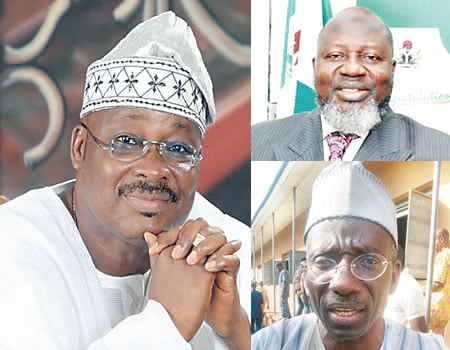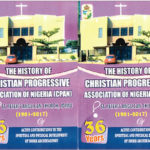WHEN the Oke-Ogun Development Consultative Forum (ODCF), after three days of touring the 10 local governments of Oke-Ogun in consultation with the people, sent out strong words that the people of the were prepared to produce the next governor of the state and that it would no longer accept the deputy governorship slot, things became clear that the agitation for power rotation might have taken a definitive dimension this time round.
ODCF, which is the umbrella body of all socio-cultural groups in Oke-Ogun zone of Oyo State, had held consultations with indigenes of the zone at the headquarters of each local government, where its president and former physician to former President Olusegun Obasanjo, Dr Olusegun Ajuwon, told the people in clear terms how the zone had faired under successive governments and why it must be allowed to produce the next governor.
From Igbeti in Olorunsogo Local Government, where the tour started penultimate Thursday to Kisi in Irepo Local Government and Igboho in Oorelope Local Government, the ODCF’s message had been clear and uniform: That in the interest of equity, fairness and justice, Oke-Ogun zone, which population ranks second after Ibadan zone and with the largest landmass as well as 10 of the 33 local government areas of Oyo State, should be allowed to produce the successor to Governor Abiola Ajimobi in 2019.
The ODCF tour had traversed seven other local governments, converging on town centres and town halls in Ago-Amodu, Saki, Tede, Okeho, Iwere Ile, Otu and finally Iseyin, where thousands of Oke-Ogun indigenes voiced out their determination to ensure power shift in the state in 2019.
According to Ajuwon, Oke-Ogun had been playing second fiddle for too long and its people had become tired of producing the deputy governor of the state, a development which he said was made clear on July 7, 2017, when the ODCF held a world press conference in Ibadan, the state capital, to tell the world that “enough is enough.”
He maintained that the people of the zone were resolved to reject the second fiddle syndrome in 2019, noting that Oke-Ogun would not only reject the post of deputy governor but also ensure that it “supports only its indigene to become the governor of the state,” saying the continuous neglect of the area had to change “for the sake of fairness and equity, which is the definition of justice and the spirit of democracy.”
“We have complained that all the roads linking Oke-Ogun area to the state capital are bad and have virtually remained so forever. We also stated that we have no federal institutions present in Oke-Ogun in the forms of schools, industries or agencies, except the Nigeria Police and some uniformed agencies collecting taxes as immigration or custom duties, none of which is accruing to Oke-Ogun that harbours a significant stretch of the nation’s borders,” Ajuwon said, saying the perpetual neglect of the area made the clamour to produce the next governor imperative.
Officially, several political gladiators from Oke-Ogun had begun the moves to succeed Governor Ajimobi, with the Minister of Communications, Alhaji Adebayo Shittu; former Senior Special Assistant to Vice-President Atiku Abubakar, Dr Adeolu Akande; Editor of the Guardian newspaper, Mr Debo Adesina; former head of the Oyo State Road Maintenance Agency (OYSROMA) and an engineer, Alhaji Remi Olaniyan already among those said be eyeing the number one seat. Others include former and serving commissioners in the Ajimobi government.
With thousands of indigenes in attendance across the local governments, egging the ODCF on in a task that they believe would end in success, however, there are several issues for determination, issues that will not only decide the direction of things with regards to Oke-Ogun’s clamour to produce the next governor but also affect the eventual outcome of the 2019 race; such as how well Oke-Ogun could rally other zones of the state to support its aspiration to produce the next governor, whether the zone would unite to present a single candidate out of the many aspirants and how well such candidate would be able to rally support across the state.
But the ODCF, at the consultative meetings in 10 towns of the 10 local governments, tried to proffer answers to some of these puzzles, promising to continue consultation and to return to the people again with a final decision on the way forward regarding what they describe as the Oke-Ogun Agenda to produce the next governor.
According to Ajuwon, the zone was well aware that it would need the support of Ibadan, Ibarapa, Oyo and Ogbomoso zones of the state in its aspiration to produce the next governor. He added that the ODCF as well “most, if not all our royal fathers in Oke-Ogun land are convinced about the need to have a citizen of the zone as the next governor of the state and we know that the votes of the people from Oke-Ogun alone is not sufficient to win the governorship election. We need the support of other areas of the state. In the process of getting the right candidate, Oke-Ogun will put its best foot forward.”
Truly, at each of the local government headquarters, the presence of the traditional rulers and royal institutions buoyed the resolve of the region, as leading royal fathers including the Onjo of Okeho; Oniro of Otu and the Aseyin of Iseyin, Oba Abdulganiyu Adekunle Salau, joined their voices to say “it is Oke-Ogun’s turn to be governor.”
While speaking with Sunday Tribune, Ajuwon pointed out that Oke-Ogun’s clamour to produce the next governor of the state was by no means a confrontation but a demand in the interest of equity, fairness and peaceful co-existence, noting that the state governor, Senator Abiola Ajimobi, had shown the commitment to those ideals by coming out publicly to say that he would support Oke-Ogun to produce the next governor and that the people of the state would engage the people of Ibadan and other zones on the need to support Oke-Ogun.
The governor had, while speaking at the burial ceremony of an All Progressives Congress (APC) in Oke Ogun area of the state few months ago, maintained that he was resolved to support the clamour for Oke Ogun to produce the next governor of the state, saying: “I can recall vividly that during the 2015 governorship election, I won in nine out of the 10 local governments in Oke Ogun, and this aided my emergence as the first governor to secure a second term in office in Oyo State. I cannot thank you enough.
“I will forever cherish you my people from Oke Ogun and I am using this opportunity to assure you that I will reciprocate your love for me. Without prejudice to the competence and legitimacy of aspirants from other zones nursing the ambition of succeeding me, I can say the people of Oke Ogun deserve my support. But, I will advise that you seek the support of people from other zones. You must win them over to win a governorship election. For instance, Ibadan people alone constitute about 52 per cent of the population.”
The road to the current clamour
Since the advent of the current fourth republic in 1999, which will be a period of 20 years by 2019, the Ibadan geopolitical zone would have been in the saddle for 15 years. While the Ogbomoso zone occupied the seat for four years and 11 months through former Governor Adebayo Alao-Akala, the trio of Alhaji Lam Adesina, Senator Rashidi Ladoja and Governor Ajimobi held office between 1999 to 2003; 2003 to 2007 and from 2011 to date.
Before 1999, two Ibadan indigenes, Dr Omololu Olunloyo (1983 to 1985) and the late Chief Kolapo Isola (1991 to 1992) and one Ijesha, the late Chief Bola Ige (1979 to 1983) spent a combined eight years in the saddle as elected governors.
The issues
But while power shift agitators continue to note that it is Oke-Ogun’s turn to be governor and that no zone in the state has a monopoly of qualified people that could hold the number one position, key watchers of political events in the state and those versed in the art of politicking have consistently noted that the politics of the state had moved beyond the plane of sentiment, adding that reason and superior argument must be advanced by any zone desirous of power rotation. This school of thought also maintained that merit should be the issue in discourse and mere clamour for power shift.
The trio of Akande, Olaniyan and Adesina maintained that the clamour by Oke-Ogun was not in any way an attempt to sacrifice merit for zoning. Olaniyan maintained that no zone could boast of having a monopoly of qualified governorship aspirants, saying that Oke-Ogun’s agitation to produce the next governor could not be said to placing zoning above merit. Adesina and Akande took a similar stance in separate interviews with Sunday Tribune.
Another key issue ahead of the 2019 governorship race in the state is that of voting population. Apart from being the state capital, Ibadan has always been a key decider in the politics of Oyo State. According to the 2006 census report, while Oke Ogun had 1.4 million people, Ibadan has over 2.5 million people.
The ODCF had, during the consultative meetings in the 10 local governments, made it clear that Oke-Ogun was well-aware that its votes alone would not be sufficient to win the governorship election, noting that it was prepared to work with other zones to achieve the mandate of governing the state. Ajuwon added that the ODCF would take its campaign to all the four other zones in the state.
But observers of political developments in the state have maintained that the biggest issue that might threaten the chances of the zone to produce the governor would be its inability to unite in support of a single candidate. Those in this school of thought believe that with the array of contenders for the governorship post from Oke-Ogun zone, it might be difficult to convince them to drop their ambitions to support one candidate in 2019.
Dr Ajuwon, however, had a ready answer, as he noted that ODCF was aware of the challenges a choice of candidate would pose and that it was ready to honestly and sincerely work towards picking the best candidate, who would be supported by all the people of the zone irrespective of political party affiliations. He maintained that the ODCF had encouraged all qualified indigenes of the zone to join political parties and mobilise support with a view to winning the ticket of their respective parties but that as a people, Oke-Ogun would decide on who is best and has the best chance of winning and support such individual in the 2019 election. He added that the forum would return to all the local governments to inform the people on their choice.
Day after day, as the race for the Agodi Government House becomes clearer, with more and more people throwing their hats into the ring, the questions, therefore, have been whether the Oke-Ogun Development Consultative Forum (ODCF) coalesce the people to speak with one voice in support of a candidate and thereby play the role for which the Central Council of Ibadan Indigenes (CCII) is often reputed? Will the power shift agitators in Oke-Ogun win?






